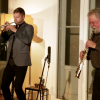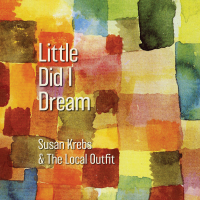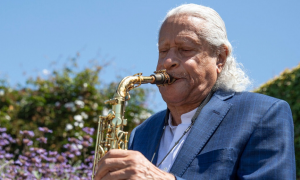Home » Jazz Articles » Interview » Casey Benjamin: EclectRic Expressionism
Casey Benjamin: EclectRic Expressionism
CB: Yea. We took a long time off. I spent a lot of time with the [Robert Glasper] Experiment and

Stefon Harris
vibraphoneb.1973
AAJ: That's good news.
CB: Me and Nicky went to high school together, she also went to La Guardia High School. That's where we met. And we've always been in musical circles and shared musical taste and that sort of thing. And we went to college together as well. We were working a lot together. Nicky always really wanted just do jazz—traditional jazz, she was a huge Carmen McRae fan. And Nicky always has been a great writer. It was like, "Now, you write so well, we should try to do something different." And I tried to convince her a little while and finally she gave in. That's how HEAVy started. During that time, it was what they call 'future soul'—that's where that came from.
AAJ: In some interviews you talked about a solo album you will bring out. And last fall, you dropped a single & music video called "Dig." Can you share some details about the music of your solo album project? In a recent interview you describe its style as "hybrid electro modern," "a mix between disco, r&b and soft rock, what people call yacht rock." Can you give an example of what you think of when you say "yacht rock"?
CB: Yea. There are shades of Steely Dan, there are shades of Michael McDonald ... Billy Joel. I've always been a fan of that sound. I love in particular the late '70s and the early '80, where we had rock and jazz, funk and like stylistically what they call yacht rock, like blue eye soul, and pop music at the time, and disco. It's just a very interesting blend and I've always been into that.
AAJ: There are different bands you were or are an important part of. One of them is the Victor Bailey Group, which I particularly like. Can you share some details about your work with Victor Bailey? How long did you work together?
CB: I met

Victor Bailey
bass, electric1960 - 2016

Poogie Bell
drums
Hugh Masekela
flugelhorn1939 - 2018
AAJ: Another important musician you work with is hip-hop artist Q-Tip. You played with him as his principal keyboardist. How did it come to your collaboration and what does it mean for your own musical development?
CB: This is actually right before Barack Obama got elected to the office—2008. I was on tour with Victor Bailey, and Robert Glasper was Q-Tip's keyboard player, and Robert Glasper called me and said "Hey, I'm actually starting to play with Maxwell." This is when Robert started playing with Maxwell. He said, "would you be into playing keyboards with Q-Tip?" And I said, "Yea, definitely, yea sure, I'd love explore it." When I got off the road I went to him, he was having rehearsals and I started playing. Me and Q-Tip knew each other, but we didn't really know each other. He wasn't aware of the fact that I was a multi-instrumentalist. He thought that I just did like one thing or whatever. He saw the depth of music I knew and we just hit it off right away. His album The Renaissance—I started touring, that album, we started. I've been working with Q-Tip for 10 years. I worked with him on Kanye West's album, we've done stuff with Pusha T, we've done stuff with Elton John, Lady Gaga, tons of other records. So, he's always been a great friend, he is just like my older brother, he's always looked over me and given me great advice over the years. I've learned so much from him.
AAJ: Are you still working together?
CB: Yes. As a matter of fact, I was speaking to him right before I got on the phone with you. Yea, we're still working together.
AAJ: Can you explain in more detail how it came to the Robert Glasper Experiment—the musical concept behind it?
CB: I don't want to get the years messed up, but this maybe has been about 2004. This is around the time Rob got signed to Blue Note—he did a couple of trio albums. Rob gave me a call one day and he said "Hey, Casey, man, I want to start this band, where we just play everything. Literally. We can literally play anything. Authentically." And Robert knew all the stuff that I was doing, that I was into electronics, that I was a very proficient jazz musician, but did other things, from electronic music, pop music. And I said "Yea, let's do it." And he wanted to put together a group—not a band where we were like all sidemen. So, the first making of the Experiment was myself, Darren Barrett on trumpet, Mark Colenburg [on drums] and Carlos Henderson or Mark Kelley [on bass]. That was the first Experiment. We played a fifty dollar gig at the Knitting Factory. So, from that point on we were just working, not really working, just doing a little random gigs here and there. And then there was this IJE conference, it's this big jazz conference they used to have—that year it was in New York. I was playing with Stefon Harris, Rob was in the audience and he heard

Derrick Hodge
bassb.1979
AAJ: My impression is that the RGX can play very differently, depending on the place or the audience you play for—sometimes more jazz like, sometimes more hip-hop like or r&b like.
CB: Yea, yea. I mean—to be honest: The audience that we try to cater to is women. At a lot of our jazz shows in the beginning—it was young white college kids, young boys or whatever, and women, that was the demography. So, the club owners said like, "This is strange, I've never seen this." This is like—obviously mainly black women, so for a lot of these jazz clubs that demography was very strange, they would have never seen that. We were well with that, and that works.
AAJ: No jazz police?
CB: There was jazz police. There was always jazz police—just like "Oh, what is this hip-hop stuff?" But mostly it didn't matter—because all the kids liked it. And they're the ones to dictate everything.
AAJ: I listened to some RGX live recordings, and—as I just said—my impression is, the music can vary stylistically from place to place, audience to audience.
CB: Yea. Our first, very first Experiment festival—we opened for Wu Tang [Clan]. So, we can do fills like that and then do a very straight traditional jazz concert. There are no bands who can do that. None. The closest was The Roots, and The Roots aren't jazz, they're a hip-hop band. So, there is nobody who can actually do both of those genres authentically.
AAJ: Being a jazz musician—what does that mean to you?
CB: I never consider myself to be a jazz musician. For one, I didn't start off playing quote unquote "jazz," I started playing pop music and r&b music and stuff like that. And also, just because I play all styles of music. It is that jazz is just the spine of so many derivatives. Basically, popular music, all the different genres, are derivatives of jazz. It all comes from jazz.
AAJ: Unfortunately, jazz often is looked at as something outdated that only older generations listen to. Most people don't know about what you just said and they often ignore that jazz continues to live on and evolve until today. One can just hope that this commonly ignorant understanding of jazz will change.
CB: I think it's already beginning to change. It's the generation like these we call the millennials—they are changing. I guess I am part of the last part of that, before it became like hardcore millennial. But yea, I think it's changing already.
AAJ: Through hip-hop for example?
CB: Yea. Where everything has become basically genreless. There is fewer genres now.
AAJ: Not this labeling of different styles anymore, but just including these styles into new music—music that still has the jazz DNA?
CB: Yes, exactly. It's almost the thing, that if your music doesn't have all these different styles, people kind of look at you weird.
Tags
Comments
PREVIOUS / NEXT
Support All About Jazz
 All About Jazz has been a pillar of jazz since 1995, championing it as an art form and, more importantly, supporting the musicians who make it. Our enduring commitment has made "AAJ" one of the most culturally important websites of its kind, read by hundreds of thousands of fans, musicians and industry figures every month.
All About Jazz has been a pillar of jazz since 1995, championing it as an art form and, more importantly, supporting the musicians who make it. Our enduring commitment has made "AAJ" one of the most culturally important websites of its kind, read by hundreds of thousands of fans, musicians and industry figures every month.








 Buy Now
Buy Now


















